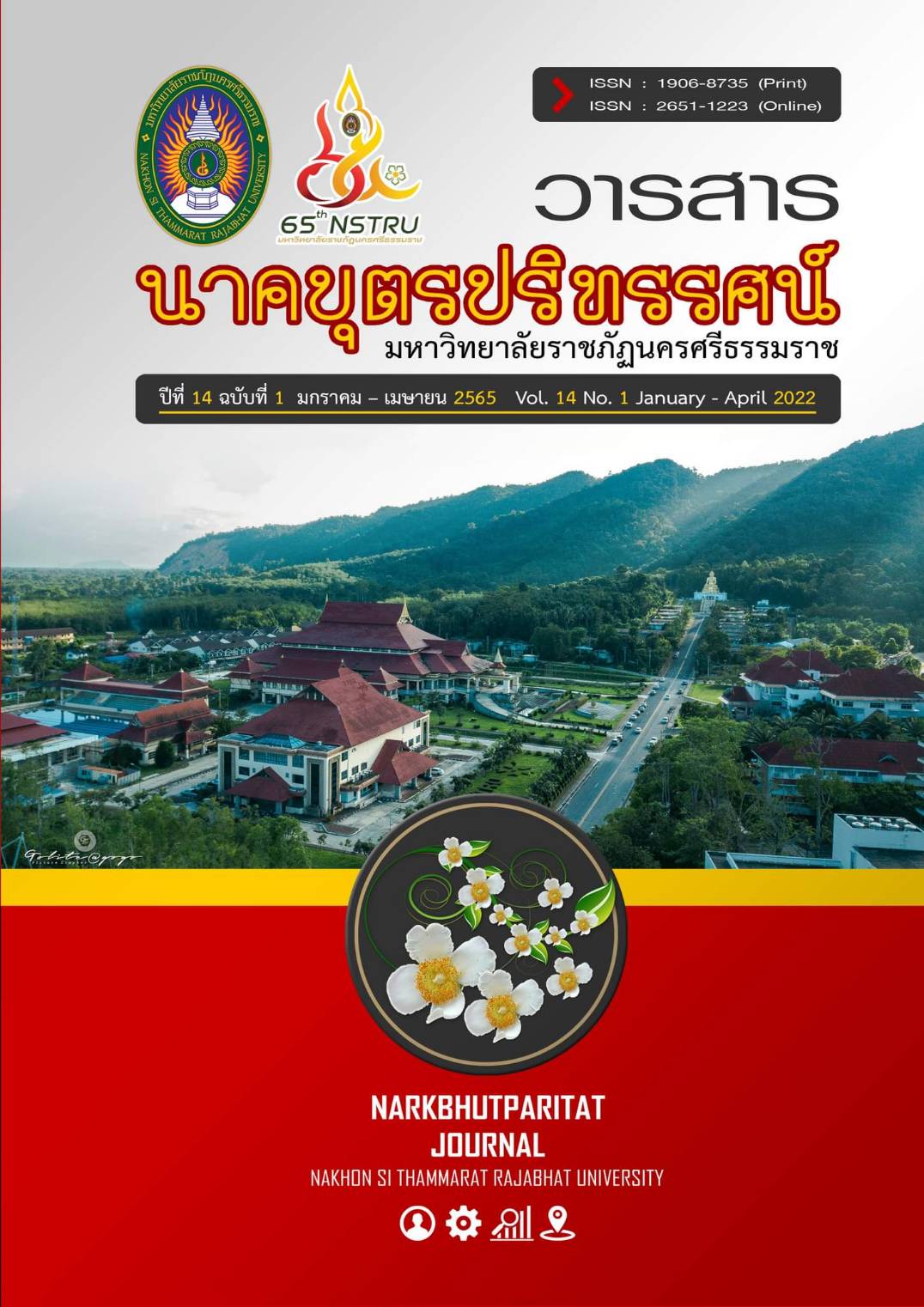การพัฒนาอีเลิร์นนิง เรื่อง ความสัมพันธ์ของสิ่งมีชีวิตในระบบนิเวศ ร่วมกับการเรียนรู้มีส่วนร่วมแบบออนไลน์ เพื่อเสริมสร้างทักษะการทำงานเป็นทีม
Main Article Content
บทคัดย่อ
การวิจัยครั้งนี้มีวัตถุประสงค์เพื่อ 1) พัฒนาอีเลิร์นนิง เรื่อง ความสัมพันธ์ของสิ่งมีชีวิตในระบบนิเวศ ร่วมกับการเรียนรู้แบบมีส่วนร่วมแบบออนไลน์ เพื่อเสริมสร้างทักษะการทำงานเป็นทีม ที่มีประสิทธิภาพตามเกณฑ์ 80;80 2) เปรียบเทียบคะแนนทดสอบก่อนเรียนกับผลสัมฤทธิ์ทางการเรียนของนักเรียน 3) ศึกษาทักษะการทำงานเป็นทีมของนักเรียน และ 4) ศึกษาความพึงพอใจต่อการจัดการเรียนการสอนด้วยอีเลิร์นนิง กลุ่มตัวอย่างในการวิจัย คือ นักเรียนชั้นมัธยมศึกษาปีที่ 3 โรงเรียนมัธยมประชานิเวศน์ ภาคเรียนที่ 1 ปีการศึกษา 2563 โดยวิธีสุ่มตัวอย่างแบบกลุ่ม จำนวน 30 คน เครื่องมือที่ใช้ในการวิจัยได้แก่ (1) อีเลิร์นนิง (2) แผนการจัดการเรียนรู้ด้วยอีเลิร์นนิง (3) แบบทดสอบก่อนเรียนและวัดผลสัมฤทธิ์ทางการเรียน (4) แบบประเมินทักษะการทำงานเป็นทีม และ (5) แบบประเมินความพึงพอใจ ผลการวิจัยพบว่า 1) อีเลิร์นนิงมีประสิทธิภาพ 84.23 ; 82.17 สูงกว่าเกณฑ์ที่กำหนด 2) คะแนนผลสัมฤทธิ์ทางการเรียนสูงกว่าคะแนนทดสอบก่อนเรียนอย่างมีนัยสำคัญทางสถิติ ที่ระดับ .01 3) ทักษะการทำงานเป็นทีมในภาพรวมของนักเรียนเมื่อเรียนด้วยอีเลิร์นนิงอยู่ในระดับมากที่สุด ( = 4.83, S.D.= 0.05) 4) ความพึงพอใจของผู้เรียนที่มีต่ออีเลิร์นนิงอยู่ในระดับมากที่สุด ( = 4.92, S.D.= 0.09)
Article Details

อนุญาตภายใต้เงื่อนไข Creative Commons Attribution-NonCommercial-NoDerivatives 4.0 International License.
เอกสารอ้างอิง
Brahmawong, C. (2013). Developmental Testing of Media and Instructional Package.
Silpakorn Educational Research Journal. 5(1), 7-12. (in Thai)
Dumnil, P. (2019). Development of learning achievement learning course, innovation and information technology in education by using e-learning and collaborative learning of the second year students in the Faculty of Art Education. Walailak Journal of Learning, 5(1), pp. 101-126. (in Thai)
Jintanon, N. (2009). Effects of Using e-learning in Chemistry Instruction on the Topic of Atomic and Periodic Table for Mathayomsuksa 4 Students. Thaksin University. (in Thai)
Khantharee, N. (2015). Development of E-learning Lesson for Under Graduated Students on
Learning. Buabandit Journal of Education Administration, 15(Oct-Dec), pp. 291-298. (in Thai)
Khemmani, T. (2002). Principle of instruction. Bangkok: Chulalongkorn University Press. (in Thai)
Ministry of Education. (2017). Cirriculum B.E. 2551 (2008) Revise 2560 (2017). Bangkok: Kurusapa Publisher. (in Thai)
Ministry of Education. (2017). Objective and Content of Science Subject Revise 2560 (2017). Bangkok: Agricultural Co-operative Federation of Thailand Printing. (in Thai)
Namyathong, K. (2009). Development of E-learning in Business Statistics Subject. Ubon Ratchathani
Rajabhat University. (in Thai)
National Institute of Educational Testing Service. (2019). Summary of Educational Test
Results Basic National level Secondary School Year 3. Retrieved 2020, February 24,
from https://www.niets.or.th/th/catalog/view/2989. (in Thai)
Office of the Education Council. (2017). Education Plan B.E. pp. 2560-2579 (2017-2036). Bangkok: Office of the Education Council. (in Thai)
Palasonthi, K., & Sroisri, N. (2016). The Development Online Learning of Participatory Learning in Pre-Production Planning subject to develop System Thinking skills for Undergraduate Students. Journal of Vocational and Technical Education, 6(11), pp. 9-17. (in Thai)
Prabphol, S. (2001). Student Centered Learning "Life Skills Education". Bangkok: Office of the National Education Commission. (in Thai)
Satiman, A., & Sureeyaphan, P. (2017). An Integrated e-Learning Instructional Model Using Cognitive Tools for Collaborative Learning. Songklanakarin: Journal of Social Sciences and Humanities, 23(2), pp. 121-143. (in Thai)


